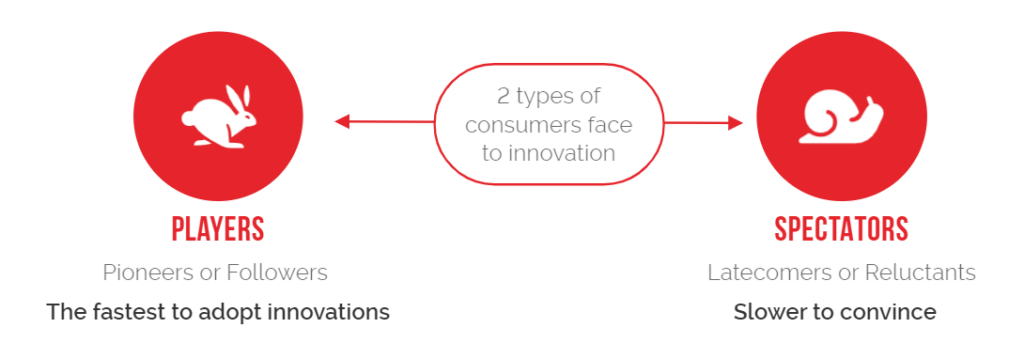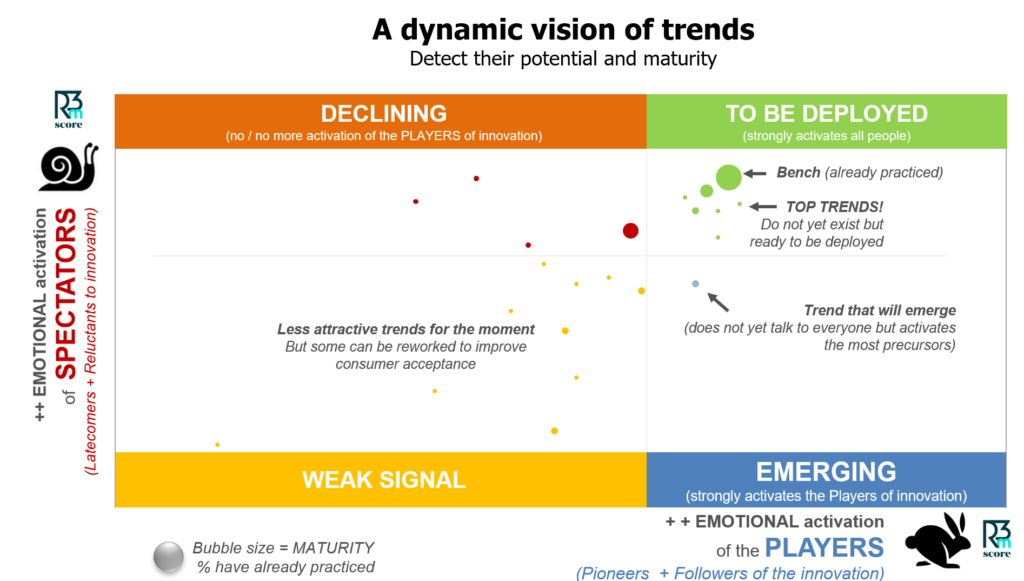/reboot/media/cb1ca522-65d6-11ef-8660-0242ac120010/2e95b5b8-3cff-11ef-8434-0242ac120012/1-1-actualite-scoring-des-tendances.jpg)
Trend Scoring : More than just monitoring !
In an evolving environment, detecting the most promising and engaging trends is key to successful innovation. But how do you identify which trends to invest in? How can you objectively assess their potential, based on consumer feedback ?
Emotional scoring : a simple, predictive measure for assessing potential
Our trend scoring method focuses on analyzing the emotional reaction of consumers, for a more predictive (i.e. going beyond the rational) and operational (i.e. prioritization and diagnosis) response.
This method is based on our R3m Score© tool, which translates consumers’ spontaneous expressions into emotional intensity using an emotional weighting algorithm applied to language. From 3 spontaneous words, we are able to quantify the emotional reaction of consumers and to identify the elements (i.e. spontaneously associated strengths and weaknesses) that contribute most to this activation.
An agile and efficient study protocol
Our scoring protocol is based on very short questioning, enabling us to evaluate several trends in succession.
2 simple questions for each trend evaluated:
- 3 spontaneous words, to measure the emotional intensity and therefore the potential of the trend
- Positioning about this trend (already practiced / interested / not for me), to assess its maturity on the market
In order to obtain a complete, dynamic analysis of the potential of each trend, the online study is carried out with a large, representative sample of the target population, including both consumers who are particularly open to innovation (i.e. “Players” of innovation, pioneers or followers, who will be the fastest to adopt innovations in your sector) and those who are more reluctant to innovate (i.e. “spectators”, slower to convince).

Dynamic positioning to assess potential and maturity
By positioning trends according to the emotional intensity they arouse among these two sub‑populations, we identify their potential and maturity:
- Trends to be deployed (which strongly activate consumers) and emerging trends (which only activate the pioneer consumers for the moment)
- Trends that need to be reworked, that are not very promising and could be optimized to improve consumer acceptance (levers identified via detailed spontaneous reactions)

A predictive study
This projective analysis, which favors system 1 (via spontaneous reactions and automatisms), enables us to detect the most promising trends and the limits/risks of others. In 2019, for example, we were able to identify the limits of an organic offer in food (in terms of price, legitimacy) if it was not accompanied by a more responsible promise such as local origin or French origin. This was before the Covid crisis and the explosion of ‘local’ products, and before the decline in organic food consumption that has been confirmed in recent years!
Whatever your business sector, our method enables you to evaluate market trends in a simple and effective manner, so that you can better orientate and accelerate the development of your future innovations.
/reboot/media/cb1ca522-65d6-11ef-8660-0242ac120010/787e00b8-f239-11f0-9151-e277effe9739/1-1-1768498909560.png)
/reboot/media/cb1ca522-65d6-11ef-8660-0242ac120010/e90e2006-4618-11f0-a1c7-ca83f24d1f3e/1-1-person-holding-dropper-80wckpt-ike.jpg)
:strip_exif()/reboot/media/cb1ca522-65d6-11ef-8660-0242ac120010/a061a626-f238-11f0-a36b-e277effe9739/1-1-1768498546937.png)